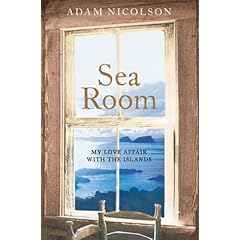 To be fair, as I will show you, he's a good writer, who finds no ends of ways to describe water in motion, be it about a boat or upon a cliff face - for those of you that have read my latest entry for the Litopia Short Story Competition (this one being Paid Companion), you will understand why I fell so easily to choose a sea-nario (SIC).
To be fair, as I will show you, he's a good writer, who finds no ends of ways to describe water in motion, be it about a boat or upon a cliff face - for those of you that have read my latest entry for the Litopia Short Story Competition (this one being Paid Companion), you will understand why I fell so easily to choose a sea-nario (SIC).Alas, for all its pretense and execution I'm stuck half way, wondering why I'm still pretending that I'll ever finish it. The problem is in the way it's a biography of a group of small islands - and I find reading biographies a dubious adventure at best (yours, Carolyn, are the exception I can assure you), but this is about rock, and sand, and sheep, and geese! It has no direction, and frankly, I don't care - but I've found that problem with all the books I'm supposed to be reading for college. They just don't touch me that way. My mind is on more important things (I hope at least).
Anyhoo, what does Adam Nicolson do right?
I always felt embraced by his presence. He whispered his stories through lips that clung doggedly to the crushed stub-end of a roll-up, his eyebrows, like sprigs of long-grown lichen, leaping at the punch lines. The movement of his mouth was so quiet, like the fluttering of a flame, that you would always be creeping closer to hear him, to put your ear in his lips. And while he spoke his eyes would move from you to the horizon and back: you, the listener, the target of the words, the horizon somehow their source.
Adam has chosen the important aspects of Hughie MacSween's character - not just his appearance. What makes Hughie MacSween Hughie MacSween? Well, that description! His ability to evoke places and people is luminous - I must pay attention :)
Later we have the descriptions of more people:
It was a charming, affectionate and mutually impatient double act. Fergus - Mike calls him Fergie - is the more bullish and macho of the two. He plays tennis for the Yorkshire Veterans, talks with fervour about 'stonking great sledge-hammers', likes to give things 'welly', wears dark glasses and short-sleeved tartan shirts, and looks after Mike, whose balance on the rocks is uncertain...
Nicolson isn't afraid to bring a person in one scene to the fore by describing their manner in another place entirely, helping to give and immediate, rounded sense of them.
The second aspect is in his ability to move from topic to topic, a skill I tried out in that latest short story compo, and, I believe, I deftly succeeded - we shall see. Anyhoo:
A gannet suddenly slaps into the sea beside me. No warning. I start at it and remember this, the story of on of the stewards of St Kilda...
I was first told that story when I was a ten-year-old boy. I stood up with shock as the crisis hit and, of course, I have never forgotten it...
It is the one bird I wish would to live on the Shaints. For a few years in the 1980s, the islands were the smallest gannetry in the world...
What you can't see are the swathes of paragraphs that separate these excerpts - I can't go pasting whole passages of someone else's work now can I? What we should note in this is the back-and-fro way the narrative moves between topics, ensuring that the reader is never jarred, but that one item/object/creature/idea helps to bring cohesion, so that the reader doesn't flounder.
You see, the kind of books I enjoy reading and the kind of books I want to write have, for some time, failed to match one another. I was writing simple, descriptive fiction, as in, I would be describing actions, dialogue and immediate thoughts. I realise that I enjoy reading sprawling narrative such as Murakami, McEwan, Irving and Angela Carter (more on her in the next blogpost). I don't do thrillers on the whole (certainly not Patterson, though I'm partial to a Dan Brown!), so why have I been attempting to write in that limited, fast paced narrative?
Lack of experience, foresight, failing in skill - now all I lack is consistency and the limitless knowledge of words that my peers have seemed able to harness.






